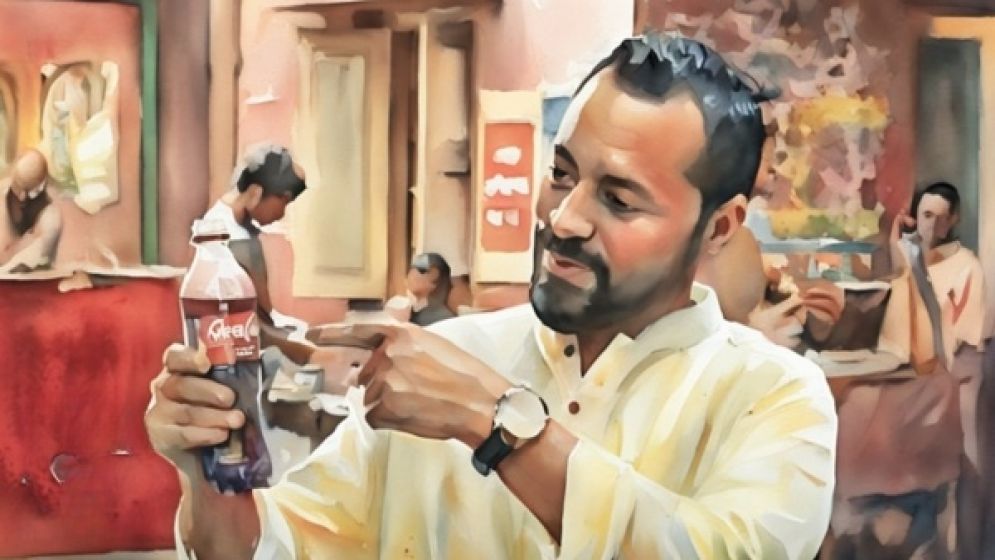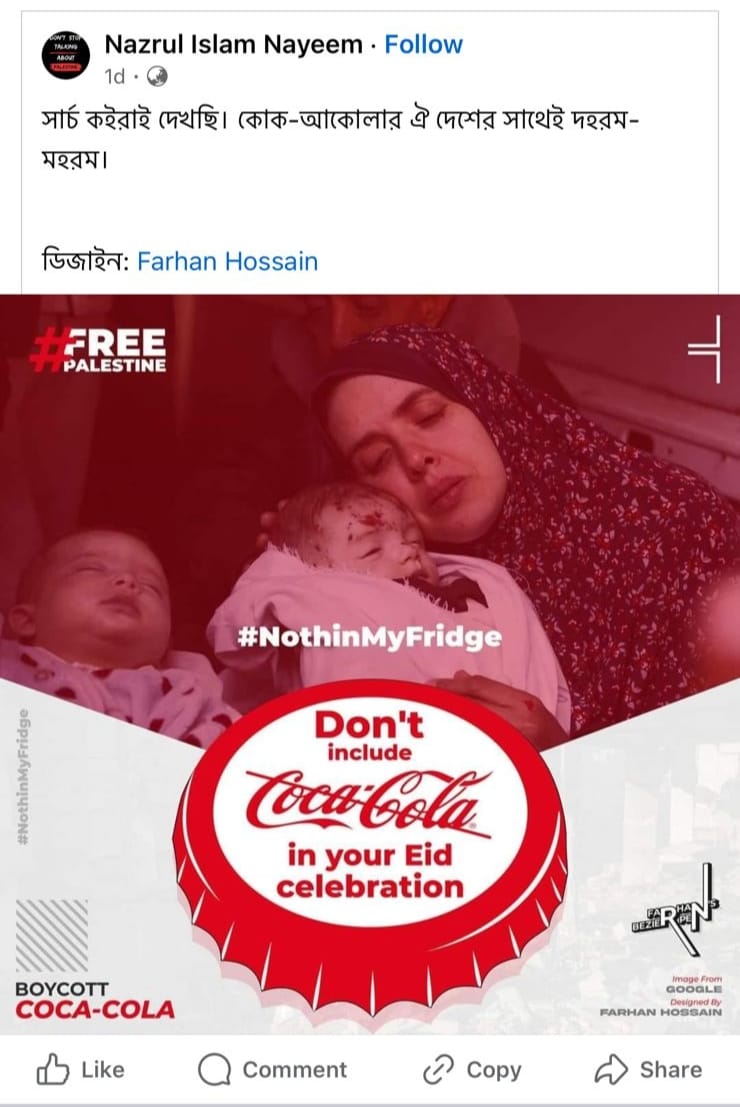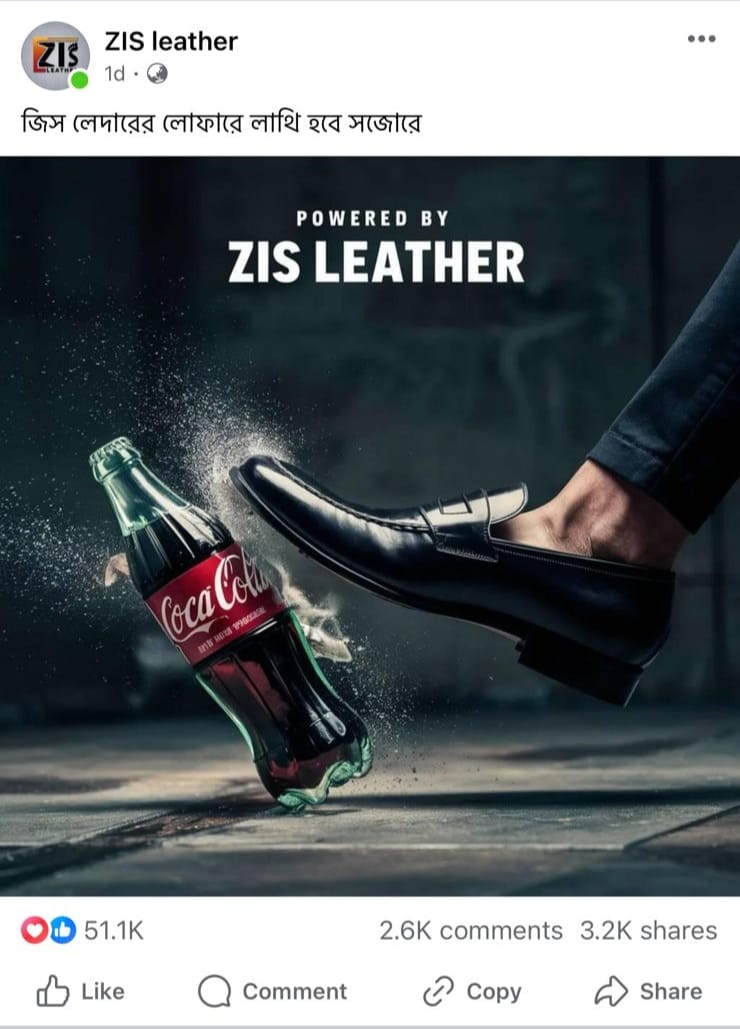
Coca-Cola's recent attempt to publicly distance itself from Israel has backfired spectacularly in Bangladesh, becoming one of the country's worst public relations crises. The situation remains incredibly volatile, with every move the American company makes threatening to further ignite public outrage.
Their decision to remove the ad from their official YouTube channel with over four million subscribers triggered a wave of social media posts highlighting Coca-Cola's perceived humiliation and defeat, attracting global media attention.
However, the company's subsequent reposting of the ad within hours sparked another public relations crisis, with many accusing them of arrogance and insensitivity to the public outcry.
The ad's lead actor and director released a social media statement defending his participation as purely professional,emphasizing his commitment to humanity. However, the overwhelming negative response to his post forced him to deactivate his Facebook account.
Bangladesh’s social media is still hot with discussions and dissections of the ad, keeping the issue burning which only translates into one thing that Coke wanted to stop: its declining sales and brand value.
When calling for fact-checking backfire?
Ironically, the ad's stated purpose was to inform the public that Coca-Cola is not an Israeli product and has no ties to the country, even encouraging viewers to verify this information themselves.
Coca-Cola's grave miscalculation was underestimating the Bangladeshi public's awareness. Most Bangladeshis never believed Coca-Cola was an Israeli product. Instead, the widespread belief is that purchasing Coca-Cola supports the Israeli military indirectly, as the American company pays taxes to the US government, a major supporter of Israel.

Therefore, the ad's message that Coca-Cola has no ties to Israel missed the mark entirely. For Bangladeshis, and many in Muslim-majority nations, boycotting Coca-Cola is primarily about pressuring the US to change its stance on the Israel-Palestine conflict.
Besides, the Boycott, Divestment and Sanction (BDS) movement, inspired by the South African anti-apartheid movement, has gained momentum globally, including in Bangladesh.
Launched in 2005 by 170 Palestinian civil society organizations, it aims to hold brands accountable for their ties to Israel and complicity in the oppression of Palestinians. By utilizing boycotts, divestment, and sanctions, this nonviolent movement pressures Israel to end its illegal occupation of Palestine.
The BDS movement experienced a resurgence following October 7, with pro-Palestine groups in Bangladesh spontaneously joining the boycott. While the effectiveness of the boycott in Bangladesh was debated, Coca-Cola's decision to release an ad addressing it demonstrates its impact.
Also, Coca-Cola's condescending tone towards Bangladeshi consumers on this issue is remarkably insensitive and disrespectful for a major multinational corporation operating in the country.
Coke’s tie with Israel
A simple internet search reveals the ties between Coca-Cola and Israel. While defenders argue that Coca-Cola functions through independent franchises and bottling partners, it's ultimately one entity providing licenses, support, and resources to these partners.
This entity, The Coca-Cola Company, is listed on the New York Stock Exchange and undoubtedly feels the impact of global boycotts, as evidenced by shifts in consumption patterns in Egypt and Bangladesh. It's absurd to suggest otherwise, given their reliance on franchising and local partnerships.
Also, Coca-Cola's global network is interconnected through business ties and shared ownership, ultimately benefiting the entire brand. For instance, in February 2024, The Coca-Cola Company (TCCC) sold its Bangladeshi bottling business to its Turkish associate, Coca-Cola İçecek (CCI), in which TCCC holds a 20% stake.
This demonstrates that Coca-Cola's operations are not isolated, and boycotts in places like Bangladesh can create ripple effects globally.
Besides, it's crucial to examine Coca-Cola's involvement in Israel's occupation beyond its operations in Palestine. Coca-Cola operates a factory in Atarot, an illegal Israeli settlement built on confiscated Palestinian land.

Such settlements in Atarot displace Palestinian communities. In 2017, the UN's human rights commissioner called out 150 companies, including Coca-Cola Israel, for operating in occupied territories, highlighting their role in the ongoing conflict.
Disturbingly, the ad termed this very factory in forcefully occupied Atarot as a “Coke factory in Palestine”, and became one of the main focal points of the ad’s backlash.
Also, while touting Coca-Cola's 138-year history, the ad conveniently omitted the company's 20-year blacklist by the Arab League starting in 1966. This ban resulted from awarding an Israeli bottling franchise to Abraham Feinberg, an American banker and president of the Israel Development Corp.
Ironically, in 1997, the Israeli government honored Coca-Cola for its "continued support of Israel" and defiance of the Arab League boycott. Since then, the company has faced numerous boycott calls due to its association with Israel, further fueled by its American identity.
Coca-Cola's ad, intended to cleanse its brand image, disregards the public's understanding of the company's ties to Israel, expecting blind trust. This patronizing approach further tarnishes their reputation.
The timing of the ad, just before Eid-ul-Adha when cola consumption peaks, suggests a motive driven by profit rather than moral responsibility.
So, it's reasonable to conclude that Coca-Cola's actions were motivated by self-preservation, not a genuine concern for ethical implications or consumer reassurance regarding their complicity in the conflict. This misguided attempt has ultimately backfired.

